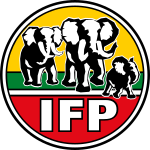
Back Inkatha-Vryheidsparty Afrikaans Partit Inkatha per la Llibertat Catalan Inkatha Freedom Party Danish Inkatha Freedom Party German Inkatha Spanish Inkatha-vapauspuolue Finnish Parti Inkatha de la liberté French Partai Kebebasan Inkatha ID Inkata Partiso di Libereso IO Partito della Libertà Inkata Italian
Inkatha Freedom Party IQembu leNkatha yeNkululeko (Zulu) | |
|---|---|
 | |
| Abbreviation | IFP |
| President | Velenkosini Hlabisa[1] |
| Chairperson | MB Gwala[1] |
| Secretary-General | Siphosethu Ngcobo[1] |
| Spokesperson | Mkhuleko Hlengwa[1] |
| Deputy President | Inkosi Buthelezi[1] |
| Deputy Secretary-General | Albert Mncwango[1] |
| Treasurer-General | Narend Singh[1] |
| Deputy Chairperson | Thembeni Madlopha-Mthethwa[1] |
| Parliamentary leader | Velenkosini Hlabisa |
| Founder | Mangosuthu Buthelezi |
| Founded | 21 March 1975 |
| Headquarters | 2 Durban Club Place Durban KwaZulu-Natal |
| Student wing | South African Democratic Students Movement |
| Ideology | Conservatism Anti-communism Ubuntu philosophy Constitutional monarchism[2] Factions: KwaZulu-Natal regionalism |
| Political position | Right-wing |
| National affiliation | Multi-Party Charter (MPC) |
| Continental affiliation | Democrat Union of Africa |
| International affiliation | International Democrat Union |
| Colours | Red |
| National Assembly seats | 14 / 400 |
| NCOP seats | 2 / 90 |
| Provincial Legislatures | 14 / 430 |
| Party flag | |
 | |
| Website | |
| www | |
The Inkatha Freedom Party (IFP; Zulu: IQembu leNkatha yeNkululeko) is a conservative political party in South Africa. Although registered as a national party, it has had only minor electoral success outside its home province of KwaZulu-Natal. Mangosuthu Buthelezi, who served as chief minister of KwaZulu during the Apartheid period, founded the party in 1975 and led it until 2019. He was succeeded as party president in 2019 by Velenkosini Hlabisa.
During the first decade of the post-Apartheid period, the IFP received over 90% of its support from ethnic Zulus. Since then, the party has worked to increase its national support by promoting social and economic conservative policies.[3] In the 2019 general election, the IFP came in fourth place nationally, winning 3.38% of the vote and 14 seats in the National Assembly.[4]
- ^ a b c d e f g h Duma, Nkosikhona (25 August 2019). "The IFP's new top six revealed". EWN. Archived from the original on 1 June 2020. Retrieved 5 April 2020.
- ^ "Article 60" (PDF). Constitution of Kwazulu-Natal. 2015. (proposed)
- ^ Piombo, Jessica (2009), Piombo, Jessica (ed.), "The Inkatha Freedom Party: Turning away from Ethnic Power", Institutions, Ethnicity, and Political Mobilization in South Africa, New York: Palgrave Macmillan US, pp. 143–162, doi:10.1057/9780230623828_8, ISBN 978-0-230-62382-8, retrieved 16 June 2023
- ^ "South Africa's ANC wins vote, loses seats; 14 parties secure seats (Final results)". Africanews. 12 May 2019. Retrieved 16 June 2023.
© MMXXIII Rich X Search. We shall prevail. All rights reserved. Rich X Search